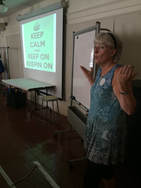
The disruptions of wintertime too often derail even the best laid plans, and this winter is throwing snow at all of us, taunting us with icy interruptions and threatening the consistency of our instruction. But, remember, your writers take their cue from you. If you continue to infuse energy and excitement into the delivery of your lessons and across your interactions with student writers despite the frustration of lost days, they will be inspired to reach the same level of engagement with the learning when you finally do get back to the work. Press on with passion!
In my last blogpost, I promised to continue to give you ideas about how to maintain a positive approach to teaching writing in order to maximize the impact that positivity has your student writers. It cannot be overemphasized how your belief in your students' efficacy as writers fuels their own feelings of self-confidence and helps them imagine themselves as authentic writers.
Today, we will continue to think about how your positive approach to individual conferences can inspire students to see possibilities and not roadblocks.
"When your differentiated instruction continually makes a bee-line for what's great in their writing, students will be encouraged to keep working, to keep reaching for precise language, organized structures, fully developed ideas, etc."
Let's talk about differentiated instruction. What does it look like and why do it? And, most importantly, how can differentiated instruction positively affect students' learning?
What: Differentiated instruction in the writer's workshop model commonly takes the form of student conferences (and, sometimes, small group instruction).
- Teachers should meet with each student individually at least once a week for a 5-6 minute conference, at a minimum. Unfortunately, schedule constraints often affect the number of conferences a teacher can manage in one week.
- The conference may take place at the student's desk, or at a separate space in the room where teacher and student can discuss the writing work.
- The conference consists of three parts:
- Research - The teacher asks the student what he is specifically working on in his writing. The student reads his writing to the teacher, who is listening to determine the writer's strengths and at the same time to discover a teaching point to help move the writer forward. Why do it? We do it because differentiated instruction is responsive to each student's learning. Your research ensures that you are meeting that writer's specific instructional needs at that moment in his learning journey. How will it positively affect your students' learning? Your students will be receiving instruction that is targeted toward their specific needs. The relevancy of the instruction will increase students' mastery of whatever process or craft move they are working on. Student writers will feel valued when you take the time to listen to their writing and then make an explicit effort to respond to their individual instructional needs.
- Compliment - This is where the power of positivity can make a substantial impact on your writer's feelings of self-confidence. Lucy Calkins says to make your compliments "a paragraph long"...don't skimp on words that will lift the writer's belief in her ability to write. Sometimes you may need to search for a positive comment if you are sitting side-by-side with a struggling writer. This is probably the most important student for whom you must find at least one aspect of the writing to compliment. And make your compliment BIG! Why do it? Because complimenting students on their writing opens them up to hearing your teaching point. By "making a bee-line" to what is great about your students' writing, you are showing the writers how much you value their work, and that message invites them into the conversation as a legitimate participant. How will it positively affect your students' learning? When you compliment the writer, you build energy and excitement for the work. Students become eager to leave the conference and get back to work when they receive positive feedback on their efforts. By honoring their work, you create energy for students to stick with the writing, building stamina and perseverance.
- Teach - This is where true differentiated instruction happens. Your teaching point will be specifically connected to the research you just did on that writer's piece as he read it aloud to you. Your teaching may or may not be in sync with the mini-lesson of the day. It depends on what the student writer is trying to do in his writing at that moment in time. Why do it? Because you want to help the writer learn how to be successful with whatever process or craft move he is working on in such a way that he can transfer it to all writing experiences. You want your teaching to supersede a particular piece of writing. And, since every student in your class may be working on a different aspect of the writing on a particular day, this is your opportunity to reach your student writers with exactly the instruction each one needs. How will if affect your students' learning? Anytime you are teaching in such a targeted way as to reach every student, you are going to maximize learning. While the whole class mini-lesson is the vehicle for instruction that moves the unit of study along, the individual conference is the opportunity for students to receive instruction that focuses the learning and allows them to apply it with razor-sharp attention to their own work.
When students never receive feedback on their writing, nor are given specific, targeted instruction to meet their individual needs, the energy for the work can diminish or, worse, turn negative. Embedding differentiated instruction through student conferences into your writing workshop is more than just best practice. Meeting with student writers each week to listen as they read their words aloud and then conduct the conference using the three steps above is the heart of your writing instruction.
Press on with passion!
#allkidscanwrite
 RSS Feed
RSS Feed
